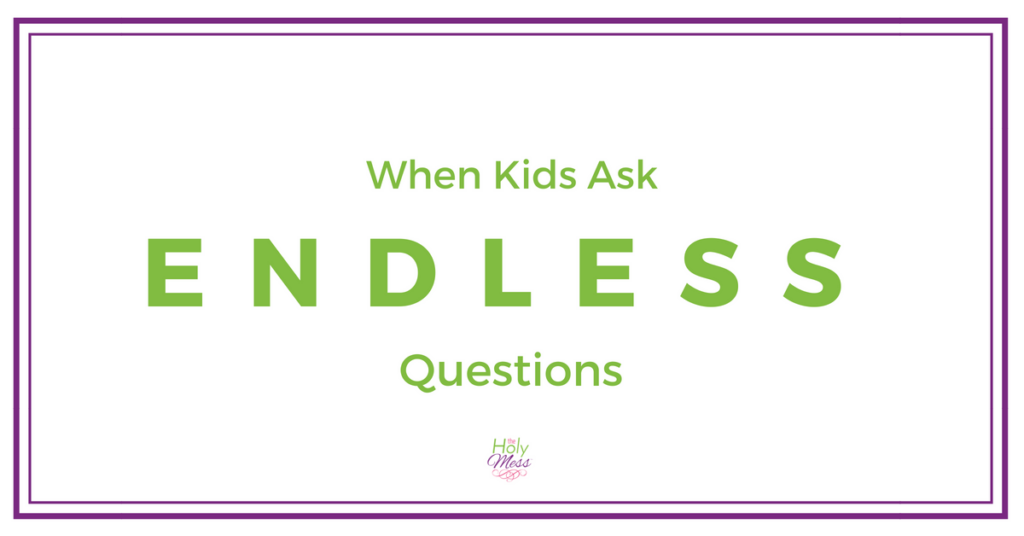During the toddler years, it can seem like you are answering a never-ending stream of your child’s questions. Everything from, “Why is the sky blue?” to, “How does Superman go to the bathroom?” is up for conversation. Despite the ways this is exhausting as a parent, questions help children learn. We expect this from a 3 year old. But what about a child who is 13 and still asks an endless stream of questions all day long? Here are tips and strategies for when you child asks endless questions.
 What’s a Normal Amount of Questions for a Kid to Ask?
What’s a Normal Amount of Questions for a Kid to Ask?
Some kids are naturally more conversational or inquisitive than others, so there is a wide range of normal. However, if at the end of the day you go to bed exhausted from what feels like the Spanish Inquisition, your child may be asking too many questions.
Conversation is a two-way street. Our job as parents is to teach our kids to be productive, socially mature adults, which includes the ability to have a healthy mutual conversation.
Why Do Kids Ask Endless Questions?
Kids ask an endless stream of questions for a variety of reasons. Ask yourself, “What need is this behavior meeting for my child?”
Here are some possibilities.
- Giftedness. Gifted children are not just smarter. They learn differently and see things in ways typical kids might not. This can lead to interesting (and sometimes endless) questions.
- Anxiety. Kids who worry too much often ask question after question. “When will we get there?” “What time are we leaving?” “Why haven’t we left yet?” “Aren’t we going to be late?” (If your child has anxiety be sure you check out the book What To Do When You Worry Too Much.
This book is fantastic.) While it might seem reassuring to answer these questions, this isn’t teaching him to use coping skills to regulate on his own.
- Control. The person asking the questions is in control of the conversation. This is especially concerning when kids ask endless questions because of attachment issues.
- Lack of empathy. When a child can’t see the other person’s perspective, they simply talk on about their own interests. This can be true in diagnosis such as Autism or Intellectual Dysfunction.
- Perseveration. Some kids get stuck on one topic either due to interest or disability or both. This isn’t necessarily a problem – until you live with someone who perseverates. The child can’t and shouldn’t be shunned from the topic totally, but he still needs to learn to interact in a socially meaningful way.
- Poor conversation skills. Some kids are just chatty, but they lack the skills to bring the other person into the conversation. This can result in an endless stream of talking or questions.
Getting to the reason behind your child’s endless questions is important. While the behavior techniques listed next are helpful in curbing the behavior, ultimately the goal is to learn what is causing the behavior and deal with the core issue.
The goal is not to limit your child’s natural curiosity but to help a child who asks endless questions in order to meet a need. Check with your child’s doctor or therapist if you have concerns.
What to Do When Kids Ask Endless Questions
When kids ask endless questions, do you need to answer every question?
No, you do not need to answer every question. This does a dis-service to your child and is exhausting for you.
Try one of these techniques to manage the behavior.
Ask a question back.
Rather than answer, choose a question to use every time your child asks a question. Here are a two of my favorites:
- What do you think?
- Where could you find the answer?
I suggest using the same question every single time. You want to be boring here.
Then quickly shift the conversation to a different topic.
Set aside a time.
Plan a specific time for questions. Let’s say at 3:00 PM daily you sit down with your child and answer all questions. During the day, deflect questions by saying, “I’ll answer that at 3:00.”
This does not mean you answer zero questions during the day, but curb the endless ones.
Question Limits
There are a number of ways to put limits on questions.
- Give your child 10 cards or tokens. He is allowed 1 question per card. When those are gone, no more questions for a time. Depending on how many questions your child asks, you might give 10 in the morning and 10 in the afternoon, for example.
- Allow a certain number of questions per activity. You might say, “I will answer 3 questions at the dinner table.” or “I’ll answer one more question during this car ride.” Then give a warning, such as, “Because you ran out of questions, if you ask me any more expect me to ignore them.” Then ignore further questions.
Practice Conversation
The dinner table is a great place to practice conversation. Here are two simple ways to practice the back and forth that is necessary for healthy interaction.
- Share highs and lows. Each person at the table shares the best thing and worst thing that happened to them that day. Other people at the table are expected to listen.
- Try conversation starters. Here is a list of 101 fun conversation starters for kids. The key here is that you don’t ask all the questions, but have your child lead some of the conversation and give meaningful feedback to the person answering.
When kids ask endless questions, the behavior can feel overwhelming. By exploring why your child is asking so many questions, you’ll get to the heart of the issue. Use the listed techniques to manage the behavior and teach your child positive ways to meet their needs – while maintaining your sanity.
Do your kids ask endless questions? How do you handle it? Share in the comments below.
More Posts You Will Love
5 Helpful Strategies for Parenting a Child with RAD
When You Feel Guilt About Parenting Decisions
How to Quickly Stop Fighting with Your Spouse About Parenting
3 Parenting Strategies that Will Bring Peace to Your Home Within Days: Part 1
FREE Parenting Hacks!

*FREE Smart Parenting Hacks Printables
*10 Printables: House Rules, Lunch Box Notes, Chores, Family Technology Agreement, Clean Eating for Kids.
*Calmer Kids = Happier You!








Leave a Reply